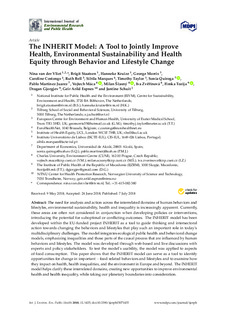| dc.contributor.author | van der Vliet, Nina | |
| dc.contributor.author | Staatsen, Brigit | |
| dc.contributor.author | Kruize, Hanneke | |
| dc.contributor.author | Morris, George A. | |
| dc.contributor.author | Costings, Caroline | |
| dc.contributor.author | Bell, Ruth | |
| dc.contributor.author | Marques, Sibila | |
| dc.contributor.author | Taylor, Timothy | |
| dc.contributor.author | Quiroga, Sonia | |
| dc.contributor.author | Juarez, Pablo Martinez | |
| dc.contributor.author | Máca, Vojtech | |
| dc.contributor.author | Ščasný, Milan | |
| dc.contributor.author | Zvěřinová, Iva | |
| dc.contributor.author | Toizija, Fimka | |
| dc.contributor.author | Gjorgjev, Dragan | |
| dc.contributor.author | Espnes, Geir Arild | |
| dc.contributor.author | Schuit, Jantine | |
| dc.date.accessioned | 2019-09-19T08:14:15Z | |
| dc.date.available | 2019-09-19T08:14:15Z | |
| dc.date.created | 2019-01-17T19:59:20Z | |
| dc.date.issued | 2018 | |
| dc.identifier.citation | International Journal of Environmental Research and Public Health. 2018, 15 (1435), . | nb_NO |
| dc.identifier.issn | 1660-4601 | |
| dc.identifier.uri | http://hdl.handle.net/11250/2617577 | |
| dc.description.abstract | The need for analysis and action across the interrelated domains of human behaviors and lifestyles, environmental sustainability, health and inequality is increasingly apparent. Currently, these areas are often not considered in conjunction when developing policies or interventions, introducing the potential for suboptimal or conflicting outcomes. The INHERIT model has been developed within the EU-funded project INHERIT as a tool to guide thinking and intersectoral action towards changing the behaviors and lifestyles that play such an important role in today’s multidisciplinary challenges. The model integrates ecological public health and behavioral change models, emphasizing inequalities and those parts of the causal process that are influenced by human behaviors and lifestyles. The model was developed through web-based and live discussions with experts and policy stakeholders. To test the model’s usability, the model was applied to aspects of food consumption. This paper shows that the INHERIT model can serve as a tool to identify opportunities for change in important −food-related behaviors and lifestyles and to examine how they impact on health, health inequalities, and the environment in Europe and beyond. The INHERIT model helps clarify these interrelated domains, creating new opportunities to improve environmental health and health inequality, while taking our planetary boundaries into consideration. | nb_NO |
| dc.language.iso | eng | nb_NO |
| dc.publisher | MDPI | nb_NO |
| dc.rights | Navngivelse 4.0 Internasjonal | * |
| dc.rights.uri | http://creativecommons.org/licenses/by/4.0/deed.no | * |
| dc.title | The INHERIT model: A tool to jointly improve health, environmental sustainability and health equity through behavior and lifestyle change | nb_NO |
| dc.type | Journal article | nb_NO |
| dc.type | Peer reviewed | nb_NO |
| dc.description.version | publishedVersion | nb_NO |
| dc.source.pagenumber | 21 | nb_NO |
| dc.source.volume | 15 | nb_NO |
| dc.source.journal | International Journal of Environmental Research and Public Health | nb_NO |
| dc.source.issue | 1435 | nb_NO |
| dc.identifier.doi | 10.3390/ijerph15071435 | |
| dc.identifier.cristin | 1659774 | |
| dc.description.localcode | © 2018 by the authors. Licensee MDPI, Basel, Switzerland. This article is an open access article distributed under the terms and conditions of the Creative Commons Attribution (CC BY) license (http://creativecommons.org/licenses/by/4.0/). | nb_NO |
| cristin.unitcode | 194,65,20,0 | |
| cristin.unitname | Institutt for samfunnsmedisin og sykepleie | |
| cristin.ispublished | true | |
| cristin.fulltext | original | |
| cristin.qualitycode | 1 | |

